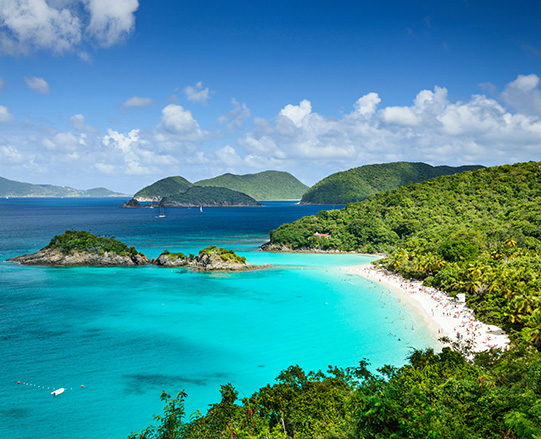Saint Vincent and the Grenadines
Saint Vincent and the Grenadines criminalises same-sex sexual activity between men and between women. Sentences include a maximum penalty of ten years’ imprisonment.
Last updated: 17 December 2024
Same-sex sexual activity is prohibited under the Criminal Code 1987, which criminalises ‘grossly indecent acts’ and acts of ‘unnatural connexion’. This provision carries a maximum penalty of ten years’ imprisonment. Only men are criminalised under this law.
The law was inherited from the British during the colonial period, in which the English criminal law was imposed upon Grenada. Grenada retained the provision upon independence and continues to criminalise same-sex sexual activity today.
There is little evidence of the law being enforced in recent years, with only one known case of an LGBT person being arrested for consensual sex, which did not result in a prosecution. There have been few reports of discrimination and violence being committed against LGBT people in recent years, likely due in part to the limited space for the LGBT community in public life.
On 1 November, ECADE announced the launch of five legal challenges to the criminalisation of private, consensual same-sex sexual activity in Antigua and Barbuda, Barbados, Grenada, St. Kitts and Nevis and St. Lucia, all expected to be filed by the end of 2019. ECADE Executive Director, Kenita Placide, said: “This is four years in the making. While the process of litigation is important, the main part of this journey was to strengthen the organisations and the communities within the countries they serve. We also needed to understand how these laws contribute to the stigmatisation of lesbian, gay, bisexual, transgender, queer and intersex (LGBTQI) people, how they legitimise hate speech, discrimination and violence and tear at the heart of the family that our society, including our governments, have sworn to protect.”
A proposal to extend the constitutional protection of certain groups to LGBT people as part of the 2016 constitutional referendum was overwhelmingly rejected by voters, apparently due to concerns that the language in the amendment might lead to the legalisation of same-sex marriage.
Civil society organisations GrenChap and Groundation Grenada filed a petition with the Inter-American Commission of Human Rights (IACHR) challenging Section 431. The IACHR urged the state to decriminalise same-sex relationships.
The Human Dignity Trust is involved in a series of cases underway in the Eastern Caribbean seeking to challenge colonial-era laws that criminalise LGBT people.

The US Department of State report for 2020, similarly to reports in recent years, noted that the government did not actively enforce the criminalising provision.
In May, a 41-year-old man was arrested after having sex with a 17-year-old man (the age of consent in Grenada is 16). Despite attempts to prosecute by the Director of Public Prosecutions, the case was eventually dismissed.
We’ve also assessed Grenada’s sexual offence laws against international human rights standards. Not only does Grenada criminalise same-sex sexual activity, it also fails to properly protect other vulnerable groups, such as women, children, and people with disability, from sexual offences.
In June, openly gay singer-songwriter, model and actor Josiah “Jonty” Robinson was found dead on BBC Beach in St George’s. The investigation into his death continues, after a second autopsy concluded that he was murdered. His friends believe it is a homophobic murder. His friend Tyler Perry, Hollywood writer and producer, offered a $100,000 reward for information in relation to the killing.
The US Department of State report noted that society was generally intolerant of same-sex conduct, and most LGBT people are not open about their identities.
In March, Human Rights Watch released a report, I Have to Leave to Be Me, in which a 22-year-old lesbian from Grenada revealed the discrimination and threats she had suffered due to her sexuality. She recounted how she was bullied in school and teachers did nothing to stop it, and two incidents, one where she was chased by a man with a harpoon after hugging a girlfriend and another when she was threatened by construction workers.
Saint Vincent and the Grenadines criminalises same-sex sexual activity between men and between women. Sentences include a maximum penalty of ten years’ imprisonment.
Jamaica criminalises same-sex sexual activity between men. Sentences include a maximum penalty of ten years’ imprisonment with hard labour.
Saint Lucia criminalises same-sex sexual activity between men and between women. Sentences include a maximum penalty of ten years’ imprisonment.
a local organisation of sexual and reproductive health advocates, focusing on key populations in Grenada.
The country profiles on the Human Dignity Trust’s website are developed through a combination of in-house expertise and research, including monitoring media reports; sourcing reports from partners and stakeholders; and reviewing reports from governments and other human rights organisations.
We go to great lengths to ensure that, to the best of our knowledge, the information provided on our website is correct and up to date. If you believe that any information on our website is inaccurate, you may bring this to our attention by e-mailing administrator@humandignitytrust.org.
Information on this website is provided for general use only and should not be relied on as a definitive position on the law as it applies at any given time. No liability can be accepted for any use of the information in this website and/or links from it.
Over 60 countries still criminalise LGBT people. Together, we can bring this number down. A donation today will help continue our vital support for LGBT people and governments seeking to change laws around the world.
DonateJoin our newsletter to receive regular updates about decriminalisation efforts around the world, including breaking news on key legal cases, hot off the press reports, invitations to events and messages from our Chief Executive.